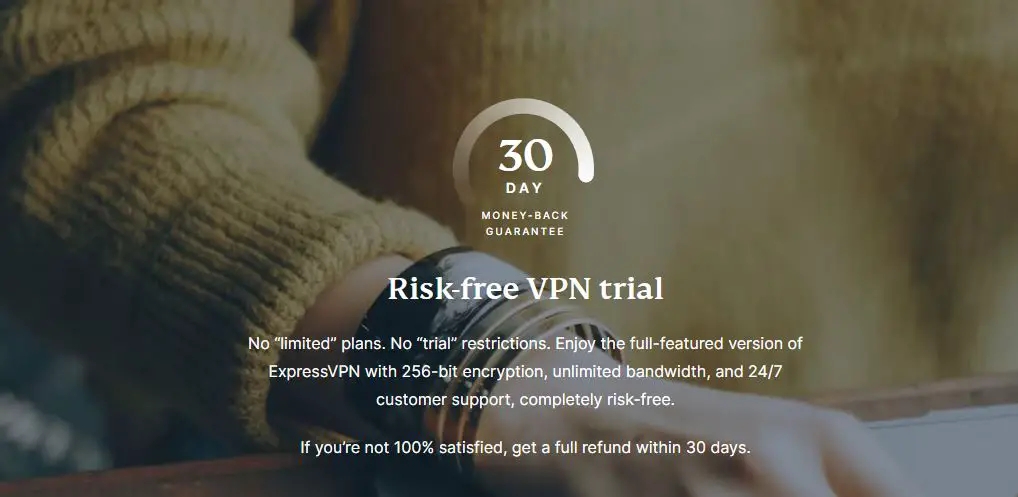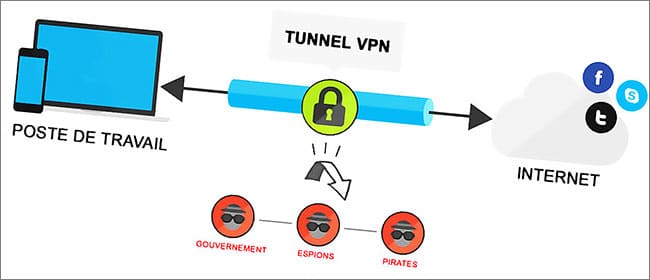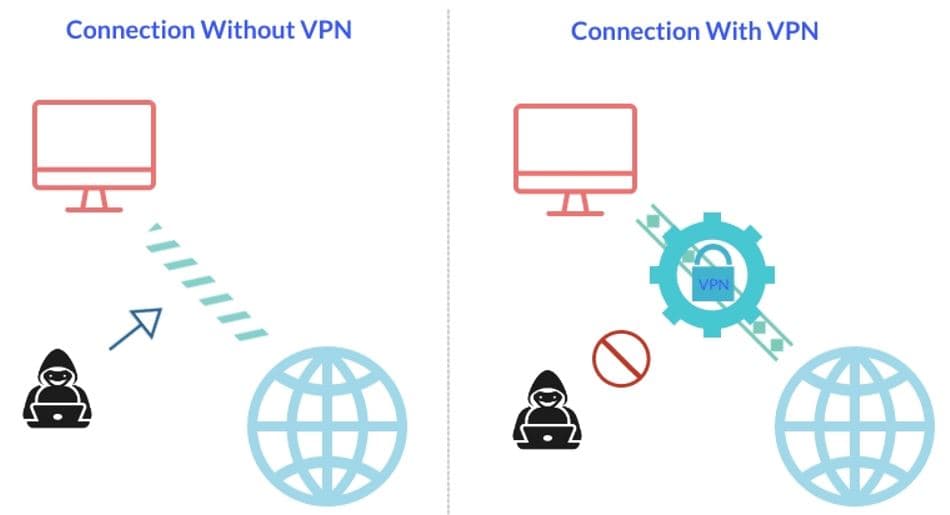If you are a frequent internet user, you probably may have heard of virtual private networks (VPN). Using a VPN secures your data and privacy, protects you on public WiFi, allows bypass geo-restriction, safely downloads torrents, unblocks Netflix, and more. VPN encrypts all outgoing and incoming internet traffic, masks your IP address and adds an extra layer of security so you can Browse the Internet Anonymously. Overall using a VPN is the very first step to secure digital activity or hide your browser history from prying eyes. But what if we told you all VPN are not safe as you think, yes cheap or free VPNs are dangerous and offer a false sense of security. This article explores VPN technology, Are VPNs Safe to Use or Not, and Also, answers the risk of using a free VPN.
What Is a VPN how does it work?
A VPN stands for Virtual Private Network is an online service that allows hide your browsing activity, identity, and location so you can Browse the Internet Anonymously. It establishes a secure and encrypted connection between a user’s device and a remote server operated by the VPN provider.
VPN provides a shield against potential hackers, cybercriminals, and surveillance. To achieve this VPN creates a secure tunnel and all data is transferred through this tunnel only. Encrypt all outgoing and incoming internet traffic, using robust encryption protocols, such as AES-256, to safeguard data during transit. The data transmitted between the user and the VPN server becomes unreadable to anyone attempting to intercept it. In addition, VPN masks the actual IP address and location with the VPN server’s location which adds an additional layer of privacy and security.
Are VPNs Safe to Use?
The short answer is YES, VPNs are safe to use but it’s crucial to choose the right one. VPNs are excellent tools to safeguard your internet traffic and browsing activities. It encrypts data, and masks your real IP address and location, making it harder to track your online movements.
Data Encryption: VPN encrypts your internet data, protecting it from prying eyes, including your internet service provider (ISP) and potential hackers.
IP Address Masking: VPNs hide the user’s IP address, making it difficult for websites, advertisers, or hackers to track their online activities.
Secure on Public Wi-Fi: If you are connected to Public WiFi networks, such as in cafes or airports, using a VPN can protect your data from being intercepted by others on the same network.
Bypass Geo-restrictions: VPNs allow you to change your virtual location, making it possible to access content that might be geographically restricted in your actual location, such as accessing websites, streaming services, and online content from different regions.
Circumvent Censorship: In countries with internet censorship or restrictions on certain websites, a VPN can help bypass these limitations, granting access to the open internet.
Anonymous Torrenting: Some VPNs allow anonymous torrenting, providing a layer of protection while downloading files from peer-to-peer networks.
Avoid ISP Throttling: In some cases, using a VPN can help avoid internet throttling imposed by ISPs, allowing for smoother and faster internet browsing and streaming.
A VPN also provides a more stable and secure connection for online gaming, reducing lag and protecting against Distributed Denial of Service (DDoS) attacks.
Are Free VPNs Safe?
Free VPNs also promise security, encryption, privacy, and anonymity. But Some free VPN providers might log your data, track your activities, or even sell your information to advertisers, compromising your privacy. Here are The risk of using Cheap or Free VPNs.
Limited Security: Free VPNs may compromise on security features, offering weaker encryption or outdated protocols, leaving your data vulnerable to potential threats.
Data Collection and Sharing: Some free VPNs generate revenue by collecting user data and selling it to third-party advertisers or data brokers. This practice undermines the fundamental purpose of a VPN, as it compromises user privacy.
Advertisements and Malware: Free VPNs often inject ads into the browsing experience or may even contain malware, putting users’ devices and data at risk.
Bandwidth Limitations: Many free VPNs impose bandwidth restrictions, which can lead to slower internet speeds and hinder seamless browsing experiences.
Data Logging: Unlike reputable paid VPN services, free VPNs may log users’ online activities, leaving users exposed to potential privacy breaches.
Also, Free VPNs typically have fewer servers and limited resources, leading to erratic performance and frequent disconnections.
With a Free VPN connection, Users might believe they are protected and anonymous but in reality, their data is at risk. The weak encryption and data-logging practices of such VPNs render users vulnerable to cyberattacks and privacy violations.
For robust security, reliable performance, and genuine privacy protection, It is advised to buy a reputable VPN service such as NordVPN. A premium VPN service provider prioritizes user security, implements strong encryption, and maintains strict no-logs policies, ensuring a safer online experience for their users.
FAQ:
Can VPNs protect me from hackers and cyber threats?
- Yes, VPNs encrypt your internet traffic, making it difficult for hackers and cybercriminals to intercept or access your data. However, it’s essential to choose a reliable VPN service with strong encryption protocols to ensure maximum protection.
What are the risks of using free VPNs?
- Free VPNs often compromise on security and privacy. Some risks associated with free VPNs include weaker encryption, data logging and selling, intrusive ads, malware injections, bandwidth limitations, and unreliable performance.
Do free VPNs track my online activities?
- Some free VPNs may log and track your online activities, which can undermine the purpose of using a VPN for privacy. This data may be used for targeted advertisements or even sold to third-party companies.
Are all paid VPNs safe to use?
- Not all paid VPNs are created equal. It’s essential to research and choose a reputable paid VPN service with a proven track record of security, privacy, and transparent practices.
How can I ensure a VPN is safe before using it?
- Before using a VPN, thoroughly review the provider’s privacy policy, encryption methods, and logging practices. Look for VPNs that have been independently audited for their security practices.
What’s the best approach to ensure online safety with a VPN?
Choose a reputable paid VPN service that prioritizes security, privacy, and user support. Paid VPNs typically invest in their infrastructure to provide a safer and more reliable browsing experience
Also read:


